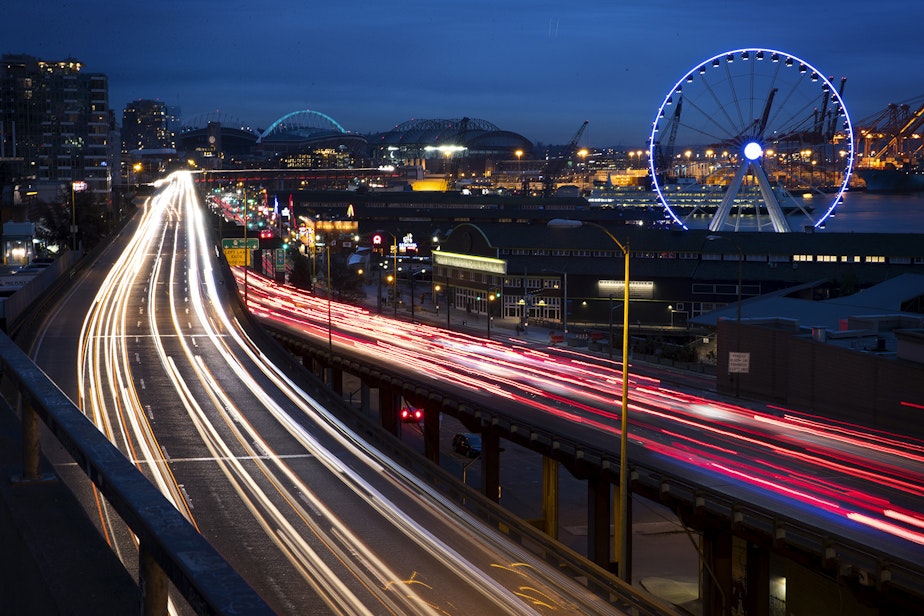Should Seattle consider a high-pay CEO tax? That’s one option to fill the city’s budget gap

A working group of Seattle civic, labor, and business leaders suggested a range of tax increases Wednesday in a new report that explores ways the city could fill a looming budget gap.
According to the report, Seattle’s spending is outpacing tax revenue. As a result, the city forecasts a deficit of around $221 million in 2025 and another $207 million in 2026.
The Revenue Stabilization Workgroup came up with nine new tax ideas to fill the gap, while also acknowledging other policies could come into play, such as spending cuts. At this point the ideas are all just ideas. It would be up to Seattle’s elected officials to implement any of them.
One of the new proposals is a CEO “high pay ratio” tax on big businesses. The idea would be to tax businesses where the CEO is paid extravagant sums compared to most of their workers.
San Francisco already has a voter-approved CEO pay ratio tax, which generated over $100 million last year.
Another new idea is a tax on vacant property, which the city estimates could generate between $5 million and $20 million per year. An added benefit, according to the report, would be to discourage real estate speculators from hoarding apartments that people could be living in.
Here again, Seattle would be following San Francisco’s lead. Starting in 2024, San Francisco will tax any property left vacant for more than 182 days a year.
The greenest idea on the list is a “congestion tax,” which would involve tolling the busiest roads “to reduce congestion and pollution.” But the report included a note of caution about how such a tax might impact low-income drivers.
Another revenue-generating idea is a city capital gains tax. Earlier this year Mayor Bruce Harrell and City Councilmember Teresa Mosqueda, who is part of the workgroup, told KUOW the city is considering such an option.
While a progressive income tax is not allowed under the state constitution, Washington now has a 7% tax on big capital gains over $250,000, which the state Supreme Court recently upheld. Any new city capital gains tax would be on top of that. According to the workgroup report, a 1% capital gains tax could generate between $25 million and $30 million annually.
The workgroup report also noted that a 1% flat income tax is an option, which could generate around $670 million a year.
Also on the report’s list of ideas is an increase to the existing JumpStart payroll tax, which currently generates hundreds of millions of dollars for the city each year. The JumpStart tax only applies to big companies like Amazon and is not a tax on people's paychecks. Rather, it's a tax on the companies themselves, provided those companies have large annual payrolls and employees who are based in Seattle.
The workgroup also mentioned city estate and inheritance taxes and a progressive real estate excise tax on luxury properties. All three would require prior state approval, according to the report.
The report also recognizes that the city could consider cutting spending in various ways, including ending services that aren’t working, or cutting spending that doesn’t align with the city’s current priorities. It’s unclear where most of Seattle’s elected officials are leaning when it comes to figuring out the mix between spending cuts and creating new taxes.
Seattle Chamber of Commerce President and CEO Rachel Smith, who was a part of the workgroup, told KUOW her members believe budget cuts and other strategies should be applied first before the city considers any new tax proposals.
“We have been encouraging the city to do a scrubbed budget process where they look at all expenditures against all revenues,” she said.
Smith applauded the report's references to other ways to close the budget gap, including efforts to generate more business, which would, in turn, mean more tax revenue to spend. Here again, Smith said these should be top priorities.
Smith also said city leaders could use the revenue generated from the current JumpStart payroll tax and other sources to fill the projected budget gap. Although some of the JumpStart revenue has been used to close the revenue gap for the current budget, none of that money is included in the forecasts for solving future deficits, because it was originally passed to address other needs.
On the other side of that issue, Councilmember Teresa Mosqueda, who co-chaired the workgroup, told KUOW JumpStart tax revenue should only go for its original purposes, which are badly in need of money, including affordable housing.
Mosqueda said the next step is for the nine new tax proposals to be further studied and possibly considered as a part of this fall's budget process. Of the tax proposals, she said, according to the report, only three could definitely move forward, if the council and mayor wanted to act on them — city capital gains tax, a CEO pay ratio tax, and an increase to the JumpStart tax.
The following is the full list of potential revenue sources the workgroup has identified for further consideration:
- Changes to JumpStart payroll expense tax
- City-level capital gains tax
- High CEO pay ratio tax
- Vacancy tax
- Progressive real estate excise tax
- Estate tax
- Inheritance tax
- Congestion tax
- Income tax

